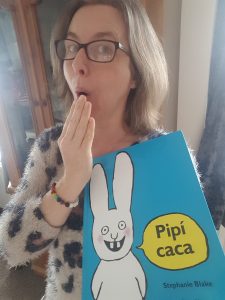
The first time I actually used this story it was because it was in my bag and when I arrived at school… let’s just say there was a big change of plan… so I improvised with “Pipí caca” to give myself time to think! It was the 1st day back after the summer break so I thought it would be good to get the children back into Spanish mode, get their ears tuned in again. I always have a “just in case” story in my bag. Do you?
Language of text: French
Type of text: picture book
Author or source: Stephanie Blake
Intended age of students: Key Stage 1/2/3
Source reference: 9788484702160 ; publishers: l’école des loisirs, Editorial Corimbo for the Spanish edition
I tell the children that the story is about a cheeky rabbit who answers “pipí caca” to everything and I therefore need their help: they can be Simón and join in to say, as a class, “pipí caca!” whenever it comes up! What giggles we have! We read it once all the way through. The last word can be used as a great reminder about how Spanish is pronounced!
On second reading, I stop and ask questions in English to check the children’s understanding of the story: for instance who is talking, what they want the little rabbit to do etc.
On third reading you can pick up out items of vocabulary or phrases that you want to focus on with your children, practise those and make a note of them.
Rationale:
I own the original version of this story, in French, “Caca boudin”, which is enjoyed so much by children over and over again; you can read about it here. I wanted to be able to share it in Spanish too!
I use it to get the children listening to Spanish words and sounds in an interactive way. It is such a fun and silly story that children just listen without realising that they cannot quite understand everything. They really enjoy it!
Outcomes:
Younger children can choose some actions that they can join in the story with and act it out whilst you read it. Older children can learn all speaking parts to act it out, as they are accessible.
You can do some great work on fronted adverbials related to the time of day: after a little practice, you could say the phrases in a different order and the children have to show they recognise them by joining in with the correct action or speaking part. They will then remember “mañana / mediodía / tarde / cuando…” for sure!
Topics or themes:
daily routine; food
Grammar:
the imperative; the preterit; different past tenses in Spanish; fronted adverbials (related to times of day)
How much time required:
1 lesson
Do you like this book? You will love other stories by Stephanie Blake! Read about them here!
What is YOUR favourite really silly story which you might share just for the fun or it? Please share it in the comments below! This one is mine!

